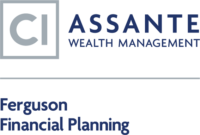How This Year’s Investment Themes are Playing Out in Real Time
As part of their April commentary, Alfred Lam, Senior Vice-President and Chief Investment Officer, and Marchello Holditch, Vice-President and Portfolio Manager, CI GAM | Multi-Asset Management, look back at their market outlook for the year to talk about which investment and economic themes are playing out as expected, and what risks and opportunities they’re looking out for.
Alfred Lam, CFA, Senior Vice-President and Chief Investment Officer
Marchello Holditch, CFA, CAIA, Vice-President and Portfolio Manager
CI GAM | Multi-Asset Management
Our market outlook going into 2021 was for ramped up vaccine deployments, accommodative monetary and fiscal policy, and upbeat corporate earnings to drive equity markets higher. We also projected an increase in interest rates and inflation. So far, these investment themes have been playing out as expected – we have seen strong performance, particularly from cyclical sectors such as energy, financials and industrials, and fixed income sold off sharply as the benchmark U.S. 10-year Treasury yield almost doubled from 0.91% to 1.74%. But what does all of this mean for the economy and markets?
Vaccines, fiscal stimulus and the consumer
Monetary and fiscal policy remain supportive. President Joe Biden signed a US$1.9 trillion American Rescue Plan into law, and Canada also unveiled additional stimulus in it’s federal budget. While the Bank of Canada is set to cut the pace of its asset purchases, they have not altered their commitment to keep interest rates low for the foreseeable future. The world is still battling a third wave of the pandemic that could prolong tight economic measures to contain the virus, but countries further along in their vaccination campaigns offer a glimpse of what is to come. Thanks to increased vaccinations and massive fiscal stimulus, U.S. consumer prices increased by the most in more than eight years, albeit off a low base.
What are we looking out for?
The biggest risk to the market, outside of a virus mutation, is if rising growth and inflation leads to rising bond yields, which could disrupt equity markets. One reason for this is that the value of a financial asset is equal to the sum of the present value of its future cash flows. But higher interest rates mean lower present values for financial assets. Companies that are expected to earn cashflows in the distant future – many of which are in the consumer discretionary and information technology sectors – are particularly vulnerable to this phenomenon.
Where are we optimistic?
With the U.S. Federal Reserve’s shift toward average inflation targeting, we believe the risk is low that central banks will feel compelled to tighten monetary conditions. Moreover, any overshoot in inflation is expected to be temporary. Remember, inflation is being fanned by stimulus payments, pent-up demand and supply chain disruptions. Many of the long-term structural deflationary forces, like automation and demographics, have not reversed.
Rising interest rates that are accompanied by a healthy economy are normal and we expect the recovery in growth to outweigh the drag from rising bond yields. We still prefer equities to bonds, and each portfolio is weighted accordingly. We remain bullish on small caps, the value factor and other beneficiaries of a strengthening economy, as well as a pickup in inflation. Inflation is a real threat to investors’ savings and our flexibility to make asset allocation changes is crucial in this environment.
Source: Bloomberg Finance L.P. and CI GAM | Multi-Asset Management as at April 10, 2021
Combined top 15 equity holdings as of March 31, 2021 of the Assante Private Portfolios 40i60e Standard portfolio with Alpha-style exposure:
- Microsoft Corp.
- Amazon.com Inc.
- Alphabet Inc. (Class A)
- Brookfield Asset Management Inc.
- Mastercard Incorporated
- Taiwan Superconductor Manufact Co Ltd.
- Intact Financial Corp.
- Royal Bank of Canada
- Apple Inc.
- Alphabet Inc. (Class C)
- Ross Stores Inc.
- Prologis Inc.
- Tencent Holdings Ltd.
- IA Financial Corp.
- UnitedHealth Group Inc.
Source: MSCI Barra

